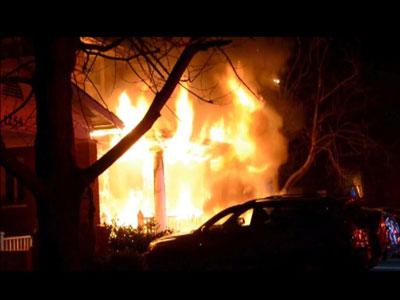Following a significant fire which occurred in off-Grounds housing in January 2013, the University’s Fire Safety office along with Charlottesville’s Fire Department and Neighborhood Development Services Department began the annual "Stop and Knock" program. The fire, which began in the early morning hours in upholstered furniture on the porch of a house on Wertland Street, displaced 13 students and caused major damage to their belongings, the house and several parked cars – fortunately, there were no injuries.
"Stop and Knock" involves University Fire Safety Officers, City firefighters and property maintenance inspectors going door to door through off-Grounds areas with high concentrations of student residents, delivering fire safety information and useful tips, property maintenance issues and other general safety messages.
"Stop and Knock" usually occurs over 2 or 3 evenings in the Autumn, and covers several City neighborhoods.
See and hear the "Stop and Knock" team in action in the videos and podcast below.
Beginning in February 2005, the University of Virginia has funded the employment of a property maintenance inspector by the City of Charlottesville’s Neighborhood Development department. This inspector is responsible for enforcing the building maintenance requirements of both City code as well as the Virginia Statewide Building Code and enhancing housing safety, with a focus on off-Grounds University student housing (including fraternities and sororities). Students are also encouraged to request inspections of indoor areas of student housing.
The inspector works with staff from the University’s Fire Safety office and the City Fire Marshal’s office to promote safety through inspections and educational opportunities such as the "Stop and Knock" program and Student Council’s Safety Fair. Coordination of activities is achieved through regular meetings and reporting. The agreement between the University and the City is currently in effect through June 2022, with renewal options every three years.
UVA Safety and Emergency Preparedness (For Students)

At 5:00 a.m. on January 21, 2013 a major house fire occurred in a popular residential area mainly inhabited by UVA students. The fire occurred on the front porch of a house on Wertland Street, home to 13 UVA students, 11 which were home and asleep at the time of the fire. Sanitation workers on their morning rounds spotted the flames. Immediately they start yelling and throwing rocks at the windows to wake everyone. Indoors, groggy students wake up and start scrambling to get out, only to find flames from a burning couch blocking the front door. The students race to the only other exit – in the back, through a bedroom, where the door is closed, but fortunately not locked. In that bedroom, the students struggle to wake up the sleeping occupant: yelling, shaking him, and pulling him out. Finally outside, they watch as their house, belongings, and several cars are destroyed. In a daze, they recognize they were lucky: this episode could have had a very different and tragic ending.
Below you can watch video of the actual fire and listen to the 911-call. The video also contains inerviews of students describing what it was like to exit a burning house, and an interview with the Deputy Fire Chief describing the harrowing event.
Wertland Street, UVA Student House Fire.